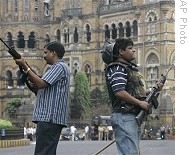voa标准英语2008-Many Indians Angry About Failure to Stop Terror
搜索关注在线英语听力室公众号:tingroom,领取免费英语资料大礼包。
(单词翻译)
A week after coordinated1 terrorist strikes killed and injured hundreds of people in India's financial hub, Mumbai, public anger is mounting at what people see as the government's failure to reduce the threat of terror strikes. As Anjana Pasricha from New Delhi, terror attacks have devastated2 several Indian cities, in the last decade. |
| Members of anti-terrorist squad3 take positions outside Chhatrapati Shivaji railroad station following rumor4 of terrorist attack in Mumbai, India, 28 Nov 2008 |
The assault by about 10-15 gunmen who wrecked5 havoc6 in Mumbai, last week, is over. But the booming sound of gunshots and images of fires billowing at the Taj Mahal Hotel in Mumbai have been imprinted7 on the minds of people across the country.
It was not the first time that an Indian city was devastated by a terror strike. This year, bomb attacks have ripped through busy markets in New Delhi, in the information-technology hub, Bangalore, Jaipur, and Ahmedabad, killing8 hundreds of people.
But the attacks in Mumbai were the bloodiest9 and most brazen10 in the last decade. And, across the country, it has unleashed11 a wave of anger at the political establishment for not formulating12 an effective strategy to tackle terror, despite repeated attacks in Indian cities. Fingers are being pointed13 at not just the government, but all politicians.
"Very angry, very, very angry at the government, the politicians, the bureaucrats14, everybody," one person said. "They have been saying they will be doing things, but they have really not done anything."
"The policy makers15 were not bothered," noted16 another.
"Instead of working together, they are now opposite each other - rather than joining hands and finding a solution for the problem we are facing," another person said.
"Very disgusted, and a lot of anger inside. We must do something at least to protect ourselves," a fourth person said.
The anger has been fueled by media reports that security agencies failed to share information and act on intelligence reports about a possible attack on luxury hotels in Mumbai.
In recent days, two politicians who went to pay condolences to families of officers killed battling the gunmen in Mumbai were turned away. In Mumbai, crowds have been gathering17 near the Gateway18 of India, adjacent to the devastated Taj Hotel, after text messages called on people to come and "tell the politicians and leaders that we want our safety." In letters to newspapers, people are attacking what they say is "a weak political system."
The call for accountability has been heard. Political heads have rolled. The federal interior minister has been replaced with former Finance Minister P. Chidambaram. He is promising19 tough action to tackle terror.
"We will respond with determination and resolve to the grave threat posed to the Indian nation," he said. "This is a threat to the very idea of India, to the very soul of India."
Civic20 groups are debating what citizens can do to contribute to the fight against terror. Not all people are just blaming the politicians. Many young people, like college student Vaibhav, say ordinary people need to do more to ensure that governance is clean and honest.
"Ultimately it is us who make them corrupt21, it is we who pay them bribes," he said. "So it is necessary we take self initiatives and work towards it together, without forming any bias22 on the basis of caste, religion or whatever."
Others, like Deepali Dalmia, say the repeated terror strikes in cities have made them fearful of being hit by another attack.
"We are hardly stepping out - especially no five-star hotels - and being a little conservative about sending children to birthdays in public places, only to people's houses. It is just not a good feeling," Dalmia said.
Observers say that, in a country that is no stranger to terror attacks, the level of concern and debate triggered by the Mumbai attacks is unprecedented23 . They say it could partly be because the attacks targeted the elite24 of India, who have not directly faced the threat so far.




